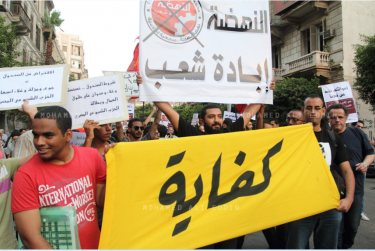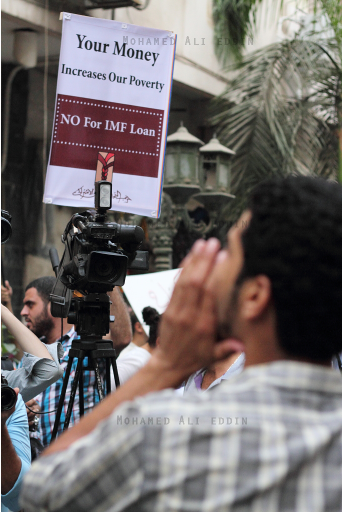Soon after the beginning of the Egyptian revolution, negotiations over a loan from the International Monetary Fund (IMF) to the Egyptian government began. The purpose of negotiations was to secure a loan that supports Egypt’s economy following the concerns over its compromising state.
Since its beginning, the negotiations were met with several setbacks. Before coming to power, Islamist parties Freedom and Justice Party (Muslim Brotherhood's political wing) along with the Salafist Al-Nour Party spoke out against the loan, even citing religious reasons to object to it. Following Mohammed Morsi's election as president, the loan negotiations resumed and the proposed 3 billion dollars loan was even increased to $4.8bn.
While presumed to boost economy and encourage foreign investment, the IMF loan was met with criticism and protest. In a letter sent to IMF Executive Director and Egyptian Prime Minister in November 2012, 18 human rights groups, political parties, and youth movements criticized the negotiation process. The letter focused on the both the IMF and the government’s failure to ensure a transparent, inclusive process and the lack of public consultation. They also questioned how the loan would truly benefit the livelihood of Egyptians, especially those in most need of it.

Protesters against IMF loan in Cairo raise banners saying ‘Enough’ and ‘Renaissance is the extermination of the people’ alluding to Morsi's promised Renaissance Project. Photograph by Mohamed Ali Eddin, used with permission
During the IMF delegation meeting last November, protesters took to the street to express their anger at the IMF loan and their concern over possible “austerity measures” that usually come as a condition of the loan. Various protests were organized under the title “No to the loan. The people want to know. The people are the decision takers”.
Indeed, President Morsi moved towards implementing an austerity package that included increasing taxes and removing subsidies. In response to vehement public criticism of the package, Morsi decided to suspend the package, resulting in a further delay of the loan negotiations.
Various social media initiatives were also used to mobilize against the loan. In a video produced by Mosireen, a non-profit media collective with a strong activism mission, Dr. Amr Adly from the Egyptian Initiative for Personal Rights, dispels the myths surrounding the austerity plan (Arabic with English subtitles). State media and some Islamist groups tried to portray the tax increase as one targeting harmful products such as cigarettes and alcoholic beverages.
The website Drop Egypt's Debt is one of the active groups rallying against the loan and used Facebook, Twitter and Youtube to create awareness around it. On Twitter, netizens cautioned from the consequences of the loan on the average citizen. Under the name (Muslim but not Brotherhood) this Twitter user ranted:
#مرسى علشان يثبت حكمة لازم ياخد قرض , وعلشان يجيب القرض يزود الاسعار ويرفع الدعم ويخلى الفقر شعار المرحلة ,, يسقط حكم ابن الوسخة #مصر
@Egypt_077: For Morsi to solidify his rule, he has to get the loan. And to get the loan, he increased prices and removed subsidies and declared that poverty is the slogan for the upcoming period. Down with the son of a bitch!
Mohammad Gramoun added:
#اقتصاد الإخوان: اللهث لتطبيق اشتراطات صندوق النقد الدولي دون حوار مجتمعي يعني الكارثة ثم الثورة الكبرى، اصلحوا هيكل الضرائب بدلا من زيادتها
@mgramoun: Muslim Brotherhood Economics: Rushing to implement IMF conditions without public dialogue which means disaster and major revolution. Reform taxing structures instead of increasing them.
In a creative way of protest, artists created a sarcastic music video (Arabic with English subtitles) on the IMF loan. The song proved a big success and managed to get more than 145,000 views in a few days.
There is a long history of IMF work with successive governments in Egypt. The economy-focused blog Rebel Economy produced a timeline of Egypt's history with the IMF. When president Anwar Sadat started introducing “Openness” neoliberal policies in the seventies, the IMF and World Bank mandated the removal of subsidies on basic foodstuffs which led to mass protests in what was known as the Bread Riots. The ensuing violent crackdown resulted in around 80 deaths and hundreds of injured.

‘Your money increases our poverty’ banner raised by protesters against IMF loan during IMF delegation visit to Cairo. Photo by Mohamed Ali Eddin, used with permission
Despite the existence of critique offered by some commentators of the movement against the anti-IMF movement, concerns and suspicions persist. The loans that were given to Egypt mandated the government implement certain economic measures. Most notably, the structural adjustment agreements that were implemented in the 90s during Hosni Mubarak's rule led to unpopular policies such as privatization, currency devaluation and subsidy removal. These policies are accused of causing mass unemployment and increasing poverty, which was one of the catalysts of Egypt's revolution.






